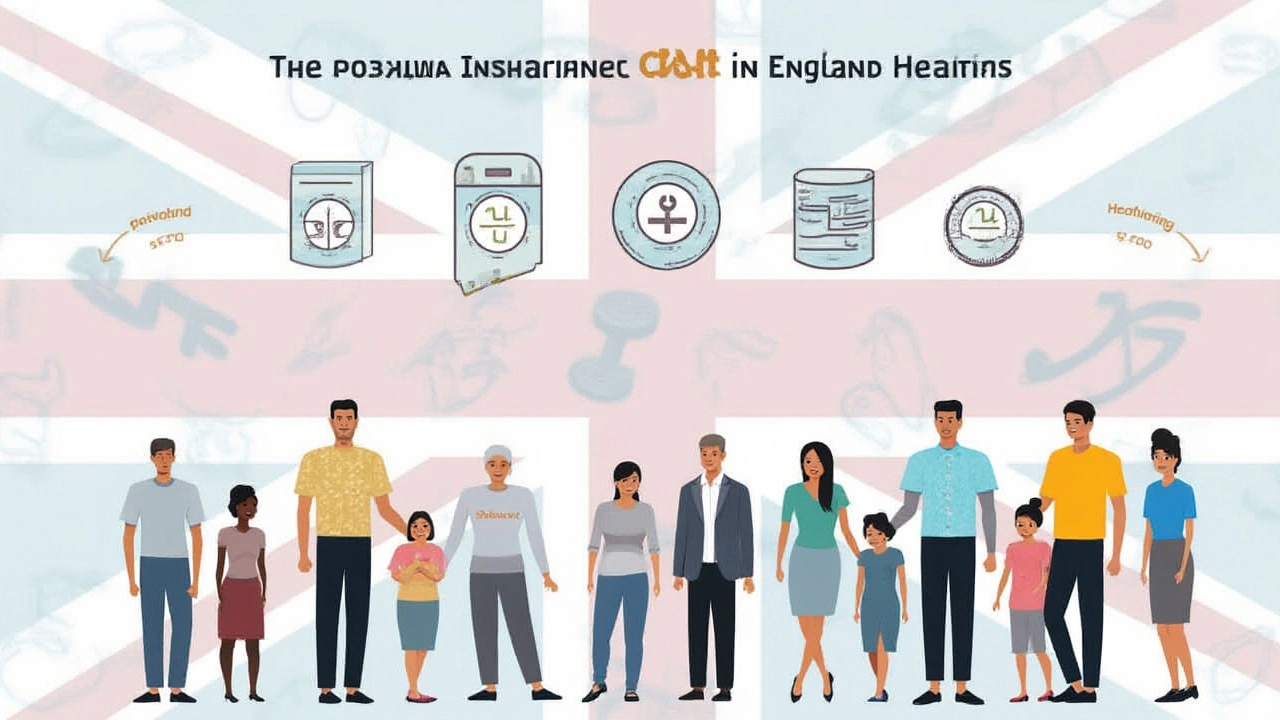 Jul, 25 2025
Jul, 25 2025
Ever get that gut-punch surprise when you see a number way higher than you thought? That’s how many folks react when they find out the real price of private health insurance in England. Most assume the NHS is all there is, so private insurance seems like something for lottery winners or footballers. But private healthcare isn’t some secret club—over 4 million people in the UK have some kind of private medical insurance, and more sign up every year, especially with NHS waiting times stretching out like the world’s slowest queue for fish and chips. Getting your head around what people pay—and why they bother—isn’t just good for comparison’s sake. It might even save you from a nasty shock later.
Private Health Insurance in England: Who Buys It and Why?
Picture yourself waiting for a routine surgery or physio, only to be told the wait is 18 months. That’s how the NHS looks right now for some treatments. It’s free at the point of use, yes, but the trade-off is time—and sometimes, choice. That’s where private medical insurance (PMI) steps in. Over 10% of UK adults now have some kind of private cover, with a large chunk in England. The appetite keeps growing, stoked by headlines about overworked A&E departments and record NHS staff vacancies.
Most people who get PMI do it through work. Employers, especially banks, tech firms, or big multinationals, often add private health cover as a perk for staff. If you land a job with a decent benefits package, your partner or kids might be covered too (for a fee). But not everyone gets a corporate lifeline. Self-employed people, freelancers, and retirees sometimes buy their own plans, especially if they can’t stand the idea of waiting ages for a consultant or they want treatments excluded by the NHS, like certain cancer drugs or mental health therapies.
Some go private for peace of mind in case of diagnosis, or for something as simple as a private room with better food. Others want quicker access to diagnostic scans—think MRIs or CTs—where the NHS bottleneck is famous. Who skips private insurance? Usually, younger folks who don’t see the value, or anyone who already finds the monthly bills a struggle. Private care doesn’t buy you everything (accidents and emergencies stay NHS only), and there’s always the fine print, but for some families, knowing you won’t have to wait months for a knee op feels priceless.
Interesting fact: Some insurers now sell “modular” plans you can pick apart, like adding cancer cover or family mental health support if you want. And thanks to price comparison sites and insurtech startups, getting a quote is easier and more competitive than it was a decade ago. Driven by the pandemic, telehealth options with private GPs have exploded—sometimes, you can get a video appointment in a couple of hours.

How Much Do People Really Pay for Health Insurance in England?
Trying to pin down an exact price for health insurance in England is like hanging wallpaper with a wet dog—there are just too many variables. But let’s strip it back: according to market research and the Association of British Insurers, the average adult policy in 2025 costs about £125 per month, or £1,500 a year for a mid-level plan. This “average” comes with giant air quotes, though, because a 27-year-old graphic designer in Bristol will not pay the same as a 55-year-old business owner in London.
If you’re early thirties and healthy, premiums start as low as £35-£50 per month for bare-bones plans. Most people opt for something in the £70-£150 range, depending on extras like cancer support, outpatient treatments, and access to top-tier London clinics. Throw in a spouse and a couple of kids, and you’re adding somewhere between 30% and 60% extra, depending on their ages. Over 60 and looking for cover? Monthly prices can rocket past £200, even £300, and some insurers won’t take new customers after age 75.
Here’s what ramps up or drags down your premiums:
- Age: The older you are, the pricier it gets—no surprise, right?
- Location: London and big southern cities cost more, because private hospitals charge more for the same hip op you’d get in Leeds or Liverpool.
- Lifestyle: Smokers pay more. Out-of-shape folks might too, though the difference isn’t as dramatic as in life insurance.
- What you want: Want acupuncture, chiropractic, or “alternative” stuff included? That’s extra. Mental health cover also adds a chunk.
- Excess (your share of a bill): Agree to pay the first £200-£500 of every claim, and you’ll see a sweet discount each month.
- History: If you’ve had a serious illness before, expect higher prices, limited cover, or outright rejection—especially for cancer survivors or folks with diabetes.
Some big names in the market? Bupa, AXA PPP, Aviva, Vitality, WPA, and newcomers like Freedom Health and National Friendly. Insurers offer joint policies for couples, family plans, even “cash plans” for dental, physio, or eye appointments (those start as low as a tenner a month but don’t cover surgery).
By 2025, inflation has nudged average premiums up about 6-8% a year. So if your mate brags about the £50/month deal they got in 2019, don’t expect to find the same bargains today.
One sneaky tip: premiums vary wildly depending on when you join. Some policies are cheapest if you start before age 35 or if you take them out via an employer. If you have pre-existing conditions, try “moratorium” underwriting—insurers ignore most illnesses you haven’t been treated for in the last five years. Or, if you’re healthy, look for “no-claims discounts”—some companies knock up to 70% off annual prices for years with no claims, but only if you don’t make any requests for scans, tests, or treatments. Watch out, though: just a single claim can reset the discount, pushing next year’s price back up.

Tips, Tricks, and Little-Known Facts About Covering Private Medical Costs
Here’s where things get personal. Friends constantly ask me why I would bother with private cover since I already pay tax for the NHS. Here’s the truth: what people forget is that private insurance isn’t just about quick surgery. Sometimes, it’s the only way to access treatments not yet approved on the NHS or to see a specialist within days, not months. If you live somewhere like Auckland like me, with private/public mix already a thing, it’s surprising how in England—the land of the NHS—more people still quietly pay for peace of mind. It isn’t just for the rich, even if it sounds that way in posh London circles.
If you’re thinking about taking the plunge or just looking for ways to cut your costs, a few tips stand out:
- Compare, compare, compare: Use online tools to get quotes from multiple providers. Even Bupa and AXA offer discounts through comparison sites.
- Annual payments: If you can, pay all at once rather than monthly to shave a few percent off the bill.
- Group buying: Some professional groups, alumni associations, or even sports clubs offer discounted group health plans—worth looking if you’re self-employed.
- Watch for limits: Some policies cap the number of outpatient visits or physio sessions, so read the fine print before signing.
- Know the exclusions: Cosmetic surgery, fertility treatments, and existing conditions nearly always cost extra or aren’t covered at all.
- NHS cash benefit: Some plans give you a cash payout if you end up using the NHS for treatment instead of going private—kind of like a refund scheme.
Insider tip: Some employers let you buy “top-up” cover if you want extra protection for your partner or kids, even if the base work plan is pretty limited. And if you’re moving to England, know that private health insurance isn’t mandatory, but getting a quote before you arrive is smart if you’ve got complex health history or you just can’t live with slow waiting lists.
Recent research showed more parents are adding children to plans so they can skip queues for things like allergy testing or ADHD assessments. Cost for a single child under 15? Often £15-£30 a month, with discounts if bundled in a family plan. And remember, insurers love to promote new tech or “digital first” services. In 2025, most plans include at least some 24/7 virtual GP appointments and wellness tracking apps, which can make it more likely you’ll pick up issues before they turn into long waits for urgent care.
Final myth to bust: having private insurance doesn’t give you special access to A&E or emergencies. Break a leg or have chest pain, you’re headed straight to the NHS just like everyone else. Heart attack? NHS every time. But for that annoying knee arthritis, mental health therapies, or worrying heart scan, private cover could mean the difference between waiting months or being seen next week. It’s an extra cost, sure, but for many in England, it feels more necessary than ever in 2025, especially as the pressure on the NHS keeps rising.
